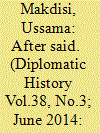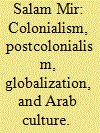|
|
|
Sort Order |
|
|
|
Items / Page
|
|
|
|
|
|
|
| Srl | Item |
| 1 |
ID:
132034


|
|
|
|
|
| Publication |
2014.
|
| Summary/Abstract |
The question of how to represent the U.S. role in the Middle East brings to the fore the question that Edward Said first raised in 1978 in Orientalism about the nature of American understandings of the Middle East. More than three decades after the publication of his book, Said's criticism of Orientalist scholarship-and his accompanying plea for a secular humanistic interpretation to replace it-remain both topical and enigmatic. It is one thing to criticize American representations of foreign cultures; it is an entirely different matter to study American engagements with them. These are by no means unrelated endeavors, but by the same token, they entail very different conceptions of what constitutes a field of inquiry and how to go about studying it comprehensively. The recent emergence of a more critical scholarship of America and the Middle East, therefore, begs the question of whether it is possible to write a history that takes both the Americans and Arabs equally seriously despite the prevailing political climate, and ultimately what kind of methodology this might entail for the rewriting of U.S.-Arab relations, and more broadly, American involvement in the world.
|
|
|
|
|
|
|
|
|
|
|
|
|
|
|
|
| 2 |
ID:
164742


|
|
|
|
|
| Summary/Abstract |
This article will address two major related issues regarding Arab culture as an integral part of the globalization ethos. In order to expand the conceptual parameters of globalization and cultural studies, the exclusivity of political and economic globalization will be interrogated in favor of a more diverse, humanitarian definition of the term. At the heart of this argument, inflected by interdisciplinarity and the literature and theory of postcolonial studies, is tolerance, respect, and recognition of difference and for the marginalized voices of the “other.” The theoretical framework challenges the stereotyping, homogenization, and misrepresentation of Arabs, colonialist ideas that have been carried over into the practice of globalism and the marginalization of Arab history and culture within world heritage. It is my hope to correct the negative perceptions about the Arab people, mainstream misperceptions of politicians, the media, and public discourse. The article will underscore the diversity and complexity of the identity and history of people in the Middle East and North Africa. Although in the West Arabs are usually synonymous with Muslims, a discussion of Islam and/or Islamophobia will not be addressed in this article. The first part will elaborate on the historical context of the creation of the modern Arab world. Next, various definitions of the main domains of globalism and their correlation to the contemporary Arab world will be summarized. Integrated into both sections are two major issues: the creative resistance that has accompanied the founding of the modern Arab world and the impact of globalization on Arab society, concepts that have played out in the containment of this region.
|
|
|
|
|
|
|
|
|
|
|
|
|
|
|
|
|
|
|
|
|